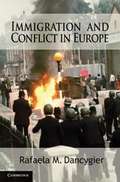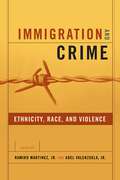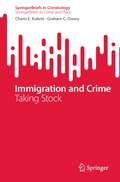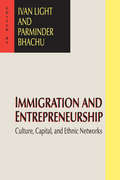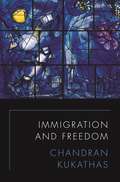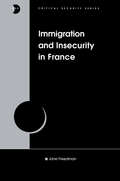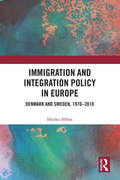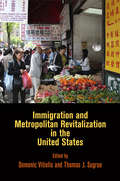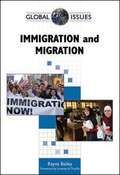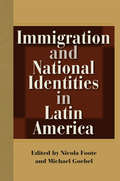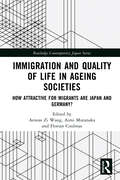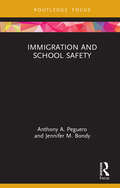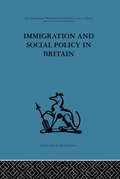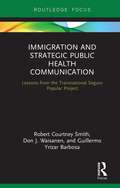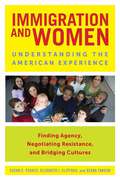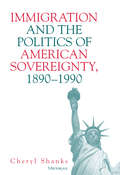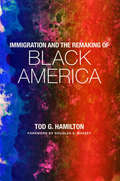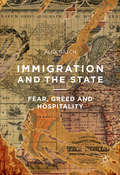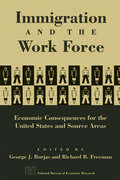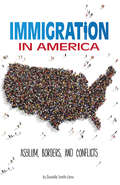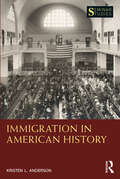- Table View
- List View
Immigration and Citizenship in Japan
by Erin Aeran ChungJapan is currently the only advanced industrial democracy with a fourth-generation immigrant problem. As other industrialized countries face the challenges of incorporating postwar immigrants, Japan continues to struggle with the incorporation of prewar immigrants and their descendants. Whereas others have focused on international norms, domestic institutions, and recent immigration, this book argues that contemporary immigration and citizenship politics in Japan reflect the strategic interaction between state efforts to control immigration and grassroots movements by multi-generational Korean resident activists to gain rights and recognition specifically as permanently settled foreign residents of Japan. Based on in-depth interviews and fieldwork conducted in Tokyo, Kawasaki, and Osaka, this book aims to further our understanding of democratic inclusion in Japan by analyzing how those who are formally excluded from the political process voice their interests and what factors contribute to the effective representation of those interests in public debate and policy.
Immigration and Conflict in Europe
by Rafaela M. DancygierContemporary debates give the impression that the presence of immigrants necessarily spells strife. Yet as Immigration and Conflict in Europe shows, the incidence of conflict involving immigrants and their descendants has varied widely across groups, cities, and countries. The book presents a theory to account for this uneven pattern, explaining why we observe clashes between immigrants and natives in some locations but not in others and why some cities experience confrontations between immigrants and state actors while others are spared from such conflicts. The book addresses how economic conditions interact with electoral incentives to account for immigrant-native and immigrant-state conflict across groups and cities within Great Britain as well as across Germany and France. The author highlights the importance of national immigration regimes and local political economies in shaping immigrants' economic position and political behavior, demonstrating how economic and electoral forces, rather than cultural differences, determine patterns of conflict and calm.
Immigration and Crime: Ethnicity, Race, and Violence (New Perspectives in Crime, Deviance, and Law #6)
by Ramiro Martinez Jr Abel Valenzuela JrAn essential collection that argues fears of immigrant crime are largely unfoundedThe original essays in this much-needed collection broadly assess the contemporary patterns of crime as related to immigration, race, and ethnicity. Immigration and Crime covers both a variety of immigrant groups—mainly from Asia, the Caribbean, and Latin America--and a variety of topics including: victimization, racial conflict, juvenile delinquency, exposure to violence, homicide, drugs, gangs, and border violence.The volume provides important insights about past understandings of immigration and crime, many based on theories that have proven to be untrue or racially biased, as well as offering new scholarship on salient topics. Overall, the contributors argue that fears of immigrant crime are largely unfounded, as immigrants are themselves often more likely to be the victims of discrimination, stigmatization, and crime rather than the perpetrators.Contributors: Avraham Astor, Carl L. Bankston III, Robert J. Bursik, Jr., Roberto G. Gonzales, Sang Hea Kil, Golnaz Komaie, Jennifer Lee, Matthew T. Lee, Ramiro Martínez, Jr., Cecilia Menjívar, Jeffrey D. Morenoff, Charlie V. Morgan, Amie L. Nielsen, Rubén G. Rumbaut, Rosaura Tafoya-Estrada, Abel Valenzuela, Jr., Min Zhou.
Immigration and Crime: Taking Stock (SpringerBriefs in Criminology)
by Charis E. Kubrin Graham C. OuseyThis brief examines various dimensions of the immigration-crime relationship in the United States. It evaluates a range of theories and arguments asserting an immigration-crime link, reviews studies examining its nature and predictors, and considers the impacts of immigration policy. Synthesizing a diverse body of scholarship across many disciplinary fields, this brief is a comprehensive resource for researchers engaged in questions of linkages between crime and immigration, citizenship, and race/ethnicity, and for those seeking to separate fact from fiction on an issue of great scientific and social importance.
Immigration and Entrepreneurship: Culture, Capital, and Ethnic Networks
by Parminder Bhachu Ivan LightMany nations invite foreigners to work within their borders, but few welcome them. Those countries that do receive a torrent of immigrants create pressures that analysts expect to intensify as population growth and social unrest mount in the less developed countries of the world. Immigration and Entrepreneurship, now in paperback, offers a comparative analysis of worldwide immigration issues while focusing more specifically on the emerging influence of entrepreneurship as a potent factor in the economic and social integration of immigrants.In linking the common immigrant and settler experiences with the upsurge in self-employment, the contributors to this volume use California as their base of comparison. The state has both a huge and varied immigrant population and an entrepreneurial economy that has facilitated the formation of immigrant-owned firms. The Los Angeles riots of the nineties indicated the volatility of the mix. Aided by ethnic and familial networks, such firms have served as a route of economic advancement.Immigration and Entrepreneurship offers a comparative perspective unique in the literature of immigration by broaching the topic from both global and local perspectives. Whereas most studies examine the experience of a single group or groups in a particular destination economy, this volume emphasizes variations in the way different nations receive immigrants as causes of differences in immigrant behavior. Among the innovative themes discussed by a range of international scholars are the entrepreneurial efforts and tensions in the garment industry in Los Angeles, Paris, and Berlin; Koreans' enterprise and identities in Los Angeles and Japan; and U.S. immigration policies. The result is a genuinely global methodology.
Immigration and Freedom
by Chandran KukathasA compelling account of the threat immigration control poses to the citizens of free societies Immigration is often seen as a danger to western liberal democracies because it threatens to undermine their fundamental values, most notably freedom and national self-determination. In this book, however, Chandran Kukathas argues that the greater threat comes not from immigration but from immigration control.Kukathas shows that immigration control is not merely about preventing outsiders from moving across borders. It is about controlling what outsiders do once in a society: whether they work, reside, study, set up businesses, or share their lives with others. But controlling outsiders—immigrants or would-be immigrants—requires regulating, monitoring, and sanctioning insiders, those citizens and residents who might otherwise hire, trade with, house, teach, or generally associate with outsiders. The more vigorously immigration control is pursued, the more seriously freedom is diminished. The search for control threatens freedom directly and weakens the values upon which it relies, notably equality and the rule of law. Kukathas demonstrates that the imagined gains from efforts to control immigration are illusory, for they do not promote economic prosperity or social solidarity. Nor does immigration control bring self-determination, since the apparatus of control is an international institutional regime that increases the power of states and their agencies at the expense of citizens. That power includes the authority to determine who is and is not an insider: to define identity itself.Looking at past and current practices across the world, Immigration and Freedom presents a critique of immigration control as an institutional reality, as well as an account of what freedom means—and why it matters.
Immigration and Insecurity in France (Critical Security Series)
by Jane FreedmanThe importance of the immigration issue in French politics has been highlighted by the success of Jean-Marie Le Pen, leader of the extreme-right Front National party, in reaching the second round of the presidential elections. This absorbing book closely examines the debate over immigration in contemporary France, looking not only at the development of immigration and nationality policies, but also at the changing discourse on the integration of immigrants. It analyzes the continuing racialization of discourse on immigration and anti-Islamic sentiment arising from the 'Islamic headscarf affair'. The work addresses issues such as the gendered nature of immigration and pays particular attention to the experiences of women immigrants in France. This careful analysis is then placed within the context of developments in the EU towards creating a unified immigration and asylum policy.
Immigration and Integration Policy in Europe: Denmark and Sweden, 1970–2010
by Haider AbbasThis book analyzes contemporary changes in immigration and integration policy in the wake of populism and rise of right-wing parties across the world. It examines how, in the face of substantial migratory flows, rising security concerns regarding immigration, and a refugee crisis of unprecedented levels, member states of the European Union have responded by calling for restrictive immigration policies, border patrolling, and intensified integration programs. Focusing on Denmark and Sweden, the volume employs a unified theoretical framework to look at how internal political debates, institutional patterns, constitutional frameworks, and political competition are key to a systematic explanation of immigration and integration policy changes in Europe. This volume will be of great interest to scholars and researchers of migration and diaspora studies, public policy, politics and international relations, sociology, and social anthropology, as well as government officials, think tanks, and policymakers.
Immigration and Membership Politics in Western Europe
by Sara Wallace GoodmanWhy are traditional nation-states newly defining membership and belonging? In the twenty-first century, several Western European states have attached obligatory civic integration requirements as conditions for citizenship and residence, which include language proficiency, country knowledge and value commitments for immigrants. This book examines this membership policy adoption and adaptation through both medium-N analysis and three paired comparisons to argue that while there is convergence in instruments, there is also significant divergence in policy purpose, design and outcomes. To explain this variation, this book focuses on the continuing, dynamic interaction of institutional path dependency and party politics. Through paired comparisons of Austria and Denmark, Germany and the United Kingdom, and the Netherlands and France, this book illustrates how variations in these factors - as well as a variety of causal processes - produce divergent civic integration policy strategies that, ultimately, preserve and anchor national understandings of membership.
Immigration and Metropolitan Revitalization in the United States (The City in the Twenty-First Century)
by Thomas J. Sugrue Domenic VitielloIn less than a generation, the dominant image of American cities has transformed from one of crisis to revitalization. Poverty, violence, and distressed schools still make headlines, but central cities and older suburbs are attracting new residents and substantial capital investment. In most accounts, native-born empty nesters, their twentysomething children, and other educated professionals are credited as the agents of change. Yet in the past decade, policy makers and scholars across the United States have come to understand that immigrants are driving metropolitan revitalization at least as much and belong at the center of the story. Immigrants have repopulated central city neighborhoods and older suburbs, reopening shuttered storefronts and boosting housing and labor markets, in every region of the United States.Immigration and Metropolitan Revitalization in the United States is the first book to document immigrant-led revitalization, with contributions by leading scholars across the social sciences. Offering radically new perspectives on both immigration and urban revitalization and examining how immigrants have transformed big cities such as New York, Chicago, and Los Angeles, as well as newer destinations such as Nashville and the suburbs of Boston and New Jersey, the volume's contributors challenge traditional notions of revitalization, often looking at working-class communities. They explore the politics of immigration and neighborhood change, demolishing simplistic assumptions that dominate popular debates about immigration. They also show how immigrants have remade cities and regions in Latin America, Africa, and other places from which they come, linking urbanization in the United States and other parts of the world.Contributors: Kenneth Ginsburg, Marilynn S. Johnson, Michael B. Katz, Gary Painter, Robert J. Sampson, Gerardo Francisco Sandoval, A.K. Sandoval-Strausz, Thomas J. Sugrue, Rachel Van Tosh, Jacob L. Vigdor, Domenic Vitiello, Jamie Winders.
Immigration and Migration
by Rayna BaileyIn this reference for readers high school level and above, Bailey, a writer and editor, examines the underlying motivations that influence people to leave their countries and the cultural, financial, and social contributions immigrants and migrants offer their adopted countries. He details the difficulties they face dealing with racial bias, assimilation, and illegal immigration, and offers a historical overview. The book also provides an outline of current immigration policy in the United States, Mexico, the Philippines, France, and South Africa; a how-to chapter on researching immigration and migration; a glossary: and a chronology of immigration and migration from pre-history to the present. Annotation ©2008 Book News, Inc., Portland, OR (booknews.com)
Immigration and National Identities in Latin America
by Nicola Foote Micheal Goebal"This groundbreaking study examines the connection between what are arguably the two most distinguishing phenomena of the modern world: the unprecedented surges in global mobility and in the creation of politically bounded spaces and identities."--Jose C. Moya, author of Cousins and Strangers "An excellent collection of studies connecting transnational migration to the construction of national identities. Highly recommended."--Luis Roniger, author of Transnational Politics in Central America "The importance of this collection goes beyond the confines of one geographic region as it offers new insight into the role of migration in the definition and redefinition of nation states everywhere."--Fraser Ottanelli, coeditor of Letters from the Spanish Civil War "This volume has set the standard for future work to follow."--Daniel Masterson, author of The History of Peru Between the mid-nineteenth and mid-twentieth centuries, an influx of Europeans, Asians, and Arabic speakers indelibly changed the face of Latin America. While many studies of this period focus on why the immigrants came to the region, this volume addresses how the newcomers helped construct national identities in the Caribbean, Mexico, Argentina, and Brazil. In these essays, some of the most respected scholars of migration history examine the range of responses--some welcoming, some xenophobic--to the newcomers. They also look at the lasting effects that Jewish, German, Chinese, Italian, and Syrian immigrants had on the economic, sociocultural, and political institutions. These explorations of assimilation, race formation, and transnationalism enrich our understanding not only of migration to Latin America but also of the impact of immigration on the construction of national identity throughout the world. Contributors: Jürgen Buchenau | Jeane DeLaney | Nicola Foote | Michael Goebel | Steven Hyland Jr. | Jeffrey Lesser | Kathleen López | Lara Putnam | Raanan Rein | Stefan Rinke | Frederik Schulze
Immigration and Politics in the New Europe
by Gallya LahavWith almost a quarter of the world's migrants, Europe has been attempting to regulate migration and harmonize immigration policy at the European level. The central dilemma exposed is how liberal democracies can reconcile the need to control the movement of people with the desire to promote open borders, free markets and liberal standards. Gallya Lahav's book traces ten years of public opinion and elite attitudes toward immigration cross-nationally to show how and why increasing EU integration may not necessarily lead to more open immigration outcomes. Empirical evidence reveals that support from both elite and public opinion has led to the adoption of restrictive immigration policies despite the requirements of open borders. Unique in bringing together original data on European legislators and national elites, longitudinal data on public opinion and institutional and policy analyses, this study provides an important insight into the processes of European integration, and globalization more broadly.
Immigration and Quality of Life in Ageing Societies: How Attractive for Migrants are Japan and Germany? (Routledge Contemporary Japan Series)
by Aeneas Zi WangThis edited book argues that a new perspective on immigration is needed. As many advanced economies are ageing, and their populations stagnate or decline, immigrants are increasingly required to fill in the gaps left behind by shrinking workforces. Against this backdrop, the outdated view that it is – and can only be – a privilege for immigrants to move temporarily from less to more developed economies needs a rethink. In particular, questions about how attractive a host destination can be for immigrants; not just in economic, but also in social, political, linguistic, and cultural terms should be raised.Considering in detail the situation in Japan and Germany – Japan where there are hardly any convenience stores without foreign employees, Germany where retirement homes would no longer function without foreign nursing staff – the book analyses migration to these two countries in different aspects such as education, training, and labour market participation, and policies and actions on the part of the state and policymakers in rendering moving to and living in these countries worthwhile.Bringing together leading scholars active in diverse aspects of migration in Japan and Germany, this book will be a valuable resource to students and scholars with an interest in immigration issues in these two countries specifically, and Europe and Asia more broadly.
Immigration and School Safety (Crime and Society Series)
by Anthony A. Peguero Jennifer M. BondyImmigration and School Safety utilizes a multidisciplinary approach to expose the complex relationship between immigration and school safety in the United States. It addresses not only individual, intrapersonal, and environmental factors but also distant-level conditions that are relevant to the experiences of immigrant children and connected to school safety. Twenty-five percent of all youth in U.S. schools have at least one immigrant parent, and that percentage is expected to increase to 33 percent by 2040. A wide array of factors, including but not limited to laws, public and political discourses, educational policies, interpersonal relationships, socioeconomic status, English language proficiency, citizenship, legal status, family characteristics, race and ethnicity, generational status, nationality, religion, and gender, contribute to the marginalizing experiences of children of immigrants at school. With the rapid growth of students in immigrant families in U.S. schools, any effort to address school violence and implement school safety policies must consider barriers associated with the unique educational experiences of that segment. This book highlights the often overlooked importance of immigration as a mediating factor in explaining both violence and victimization and provides a blueprint for integrating immigration and criminology theories into evidence-based efforts toward ensuring safety for all students. The authors demonstrate that immigration matters significantly in school violence and safety concerns and illustrate why research that integrates immigration with criminology theories is needed to understand the causes and correlates of school violence. The book will appeal to a wide array of individuals, including academics, educators, policymakers, practitioners, social workers, parents, and stakeholders who are committed to addressing educational disparities and inequities associated with immigration and school safety.
Immigration and Social Policy in Britain
by Catherine JonesTavistock Press was established as a co-operative venture between the Tavistock Institute and Routledge & Kegan Paul (RKP) in the 1950s to produce a series of major contributions across the social sciences. This volume is part of a 2001 reissue of a selection of those important works which have since gone out of print, or are difficult to locate. Published by Routledge, 112 volumes in total are being brought together under the name The International Behavioural and Social Sciences Library: Classics from the Tavistock Press. Reproduced here in facsimile, this volume was originally published in 1977 and is available individually. The collection is also available in a number of themed mini-sets of between 5 and 13 volumes, or as a complete collection.
Immigration and Strategic Public Health Communication: Lessons from the Transnational Seguro Popular Project (Routledge Research in Health Communication)
by Robert Smith Don Waisanen Guillermo Yrizar BarbosaThis book engages a key question facing governments and similar institutions in countries of immigration or emigration: how should these governments and institutions communicate with immigrants so that they will listen to and act on their messages? Drawing on original research with Mexican emigrants in New York and the Mexican government’s Seguro Popular health care program, the authors examine the ways in which governments integrate migrants into diasporic political, medical, educational, and other systems, and how migrant-sending countries communicate with their emigrants abroad. In analyzing how these efforts fail or succeed, this book presents strategies and policy recommendations that many governments and institutions can use to engage their citizens or clients ethically and effectively. Offering a valuable approach to the study of race, migration, and public policy, this book will be of key importance to researchers and graduate students in public health, sociology, marketing and business, political science, Latinx studies, and international communication.
Immigration and Women: Understanding the American Experience
by Susan C. Pearce Elizabeth J. Clifford Reena TandonThe popular debate around contemporary U.S. immigration tends to conjure images of men waiting on the side of the road for construction jobs, working in kitchens or delis, driving taxis, and sending money to their wives and families in their home countries, while women are often left out of these pictures. Immigration and Women is a national portrait of immigrant women who live in the United States today, featuring the voices of these women as they describe their contributions to work, culture, and activism.Through an examination of U.S. Census data and interviews with women across nationalities, we hear the poignant, humorous, hopeful, and defiant words of these women as they describe the often confusing terrain where they are starting new lives, creating architecture firms, building urban high-rises, caring for children, cleaning offices, producing creative works, and organizing for social change. Highlighting the gendered quality of the immigration process, Immigration and Women interrogates how human agency and societal structures interact within the intersecting social locations of gender and migration. The authors recommend changes for public policy to address the constraints these women face, insisting that new policy must be attentive to the diverse profile of today’s immigrating woman: she is both potentially vulnerable to exploitative conditions and forging new avenues of societal leadership. To learn more about the book, check out the companion site: http://immigratingwomen.wordpress.com/!
Immigration and the Challenge of Education
by Nathalia E. JaramilloAnalyzes a community from the standpoint of immigrant mothers in South Central Los Angeles who were concerned about the education of their children and the violence in their communities. Written in Spanish and English, the text brings together the women's observations as they put into action their developing political consciousness.
Immigration and the Politics of American Sovereignty, 1890-1990
by Cheryl ShanksWhat does it mean to be an American? The United States defines itself by its legal freedoms; it cannot tell its citizens who to be. Nevertheless, where possible, it must separate citizen from alien. In so doing, it defines the desirable characteristics of its citizens in immigration policy, spelling out how many and, most importantly, what sorts of persons can enter the country with the option of becoming citizens. Over the past century, the U.S. Congress argued first that prospective citizens should be judged in terms of race, then in terms of politics, then of ideology, then of wealth and skills. Each argument arose in direct response to a perceived foreign threat--a threat that was, in the government's eyes, racial, political, ideological, or economic. Immigration and the Politics of American Sovereignty traces how and why public arguments about immigrants changed over time, how some arguments came to predominate and shape policy, and what impact these arguments have had on how the United States defines and defends its sovereignty. Cheryl Shanks offers readers an explanation for immigration policy that is more distinctly political than the usual economic and cultural ones. Her study, enriched by the insights of international relations theory, adds much to our understanding of the notion of sovereignty and as such will be of interest to scholars of international relations, American politics, sociology, and American history.
Immigration and the Remaking of Black America
by Douglas S. Massey Tod G. HamiltonOver the last four decades, immigration from the Caribbean and sub-Saharan Africa to the U. S. has increased rapidly. In several states, African immigrants are now major drivers of growth in the black population. While social scientists and commentators have noted that these black immigrants’ social and economic outcomes often differ from those of their native-born counterparts, few studies have carefully analyzed the mechanisms that produce these disparities. In Immigration and the Remaking of Black America, sociologist and demographer Tod Hamilton shows how immigration is reshaping black America. He weaves together interdisciplinary scholarship with new data to enhance our understanding of the causes of socioeconomic stratification among both the native-born and newcomers. Hamilton demonstrates that immigration from the Caribbean and sub-Saharan Africa is driven by selective migration, meaning that newcomers from these countries tend to have higher educational attainment than those who stay behind. As a result, they arrive in the U.S. with some advantages over native-born blacks, and, in some cases, over whites. He also shows the importance of historical context: prior to the Civil Rights Movement, black immigrants’ socioeconomic outcomes resembled native-born blacks’ much more closely, regardless of their educational attainment in their country of origin. Today, however, certain groups of black immigrants have better outcomes than native-born black Americans—such as lower unemployment rates and higher rates of homeownership—in part because they immigrated at a time of expanding opportunities for minorities and women in general. Hamilton further finds that rates of marriage and labor force participation among native-born blacks that move away from their birth states resemble those of many black immigrants, suggesting that some disparities within the black population stem from processes associated with migration, rather than from nativity alone. Hamilton argues that failing to account for this diversity among the black population can lead to incorrect estimates of the social progress made by black Americans and the persistence of racism and discrimination. He calls for future research on racial inequality to disaggregate different black populations. By richly detailing the changing nature of black America, Immigration and the Remaking of Black America helps scholars and policymakers to better understand the complexity of racial disparities in the twenty-first century.
Immigration and the State
by Alex BalchThis bookexamines how and why liberalism and human rights have proven insufficient toprotect immigrants. Contemporary immigration systems are characterized byincreasing complexity and expanding enforcement, and frequently criticized forviolating human rights and for causing death, exclusion and exploitation. The'migrant crisis' can also be understood as a crisis of hospitality for liberaldemocracies. Through analysis of the immigration histories and politicaldynamics of Britain and the US, the book explains how these two archetypalliberal states have both sought to create a hostile environment for unwantedimmigrants. The book provides a fresh and original perspective on thedevelopment of immigration systems, showing how they have become subject to thepolitics of fear and greed, and revealing how different traditions ofhospitality have evolved, survived, and renewed.
Immigration and the Work Force: Economic Consequences for the United States and Source Areas (National Bureau of Economic Research Project Report)
by Richard B. Freeman George J. BorjasSince the 1970s, the striking increase in immigration to the United States has been accompanied by a marked change in the composition of the immigrant community, with a much higher percentage of foreign-born workers coming from Latin America and Asia and a dramatically lower percentage from Europe. This study is unique in presenting new data sets on the labor force, wage rates, and demographic conditions of both the U.S. and source-area economies through the 1980s. The contributors analyze the economic effects of immigration on the United States and selected source areas, with a focus on Puerto Rico and El Salvador. They examine the education and job performance of foreign-born workers; assimilation, fertility, and wage rates; and the impact of remittances by immigrants to family members on the overall gross domestic product of source areas.
Immigration in America: Asylum, Borders, and Conflicts (Informed!)
by Danielle Smith-LleraImmigration is a hot topic in the United States. What kind of immigration should be allowed? How should immigrants who have come into the United States illegally be treated? What about the DREAMers? Refugees seeking asylum? Will building a border wall keep out illegal immigrants and stop the flow of drugs into the U.S.? Might improving technology offer a better answer? Students will learn about the issues surrounding immigration and border security while discovering how they can get involved in helping to find a solution.
Immigration in American History (Seminar Studies)
by Kristen L. AndersonImmigration in American History is a concise examination of the experiences of immigrants from the founding of the British colonies through the present day. The most recent scholarship on immigration is integrated into an accessible narrative that embraces the multicultural nature of U.S. immigration history, keeping issues of race and power at the center of the book. Organized chronologically, this book highlights how the migration experience evolved over time and examines the interactions that occurred between different groups of migrants and the native-born. From the first interactions between the Native Americans and English colonizers at Jamestown, to the present-day debates over unauthorized immigration, the book helps students chart the evolution of American attitudes towards immigration and immigration policies and better contextualize present-day debates over immigration. The voices of immigrants are brought to the forefront in a poignant selection of primary source documents, and a glossary and "who’s who" provide students with additional context for the people and concepts featured in the text. This book will be of interest to students and scholars of American immigration history and immigration policy history.

